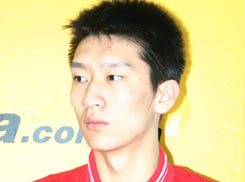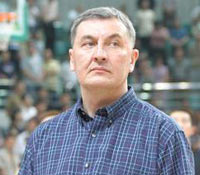| Tools: Save | Print | " target="_blank" class="style1">E-mail | Most Read |
| Basketball Association: Desperately Seeking Sun Yue |
| Adjust font size: |
|
The Chinese men's national basketball team will leave for Zunyi, Guizhou Province on June 22 to take on the US All-Star Team, comprising several former NBA celebs, in five friendly matches. It's a tournament that China is taking seriously and it needs all the good players it can get its hands on, like Sun Yue. Hu Jiashi, deputy director of the Basketball Administration Center of China's General Administration of Sports, said that they have tried in vain to contact the player's club, Aoshen, and Sun since the new roster for the national team was released in mid-June. "If he doesn't show up by June 21, the deadline for redistributing the players, he will be given up by the national team." So, just who is Sun Yue and, more important, where is he now?
"He's big for this position, good for fast breaks and he can make some jump shots," commented Jonas Kauslauskas, national team head coach. He added: "Everybody who has potential must be on the national team. For sure I think this young boy wants to be here, maybe somebody is making it difficult for him." Kauslauskas believes that Sun's placement in the national team is important as it currently lacks a strong PG. China has to work hard to train tall and quick PG so as to be able to compete with taller and faster European and American rivals. Aoshen holding Sun "to ransom" On June 17, Zang Changhong, deputy general manager of Aoshen Club went to the basketball administration "to negotiate". Zang admitted that there was "no mistake" about the team's delayed response. Zang added that Sun would only be allowed to play with the national team on condition that Aoshen be reinstated in the CBA League this year. Zang also issued a statement urging the authority to publicize its profit and loss figures. The basketball center said that the deadline for Sun's registration could be postponed and they hoped to see the player sooner rather than later. This is not the first time that the club and the center have locked horns. In May 2004, Aoshen was barred by the CBA from competing in the Chinese first-division basketball league for the 2004-05 season after the club refused to release Sun to the Chinese U-20 squad. As a result of Aoshen's suspension, the Yunnan Bulls were lifted into the premiere division to take its place. Kauslauskas said he couldn't understand the club's behavior. In his opinion, Aoshen should release the player with no strings attached. This would not be acceptable in any other country.
Jonas Kauslauskas, national team head coach Aoshen was only a mid-ranking team in the CBA league, its best position being fourth place during the 1998-99 season. But the club's private ownership makes it a club to be reckoned with, beyond the authority's jurisdiction. Prior to the CBA's reform in 1995, the basketball center performed its official functions as a governmental organ administrating the teams, most of which were affiliated to local sports bureaus. With the further development of the league, privately owned teams came into being. Established in 1997, Aoshen Club is funded by the Dongjing real estate company. The club applies for admission to the league annually, but the basketball administration center has no right to interfere with contracts between the club and its players. When the CBA called up Sun last year to play for the national team, the club thought the move might weaken the strength of the team. It therefore declined on account of Sun's "Achilles tendon". Their refusal to let Sun play for the national team was what led to their suspension in the first place. It would be interesting to see how this drama pans out. But, in the final analysis, this incident is a clear indication that the CBA is still far from professional. More needs to be done to cement the basketball administration's authority, and to develop more reasonable and flexible contracts for players. (China.org.cn by Li Xiao, June 21, 2005) |
| Tools: Save | Print | " target="_blank" class="style1">E-mail | Most Read |
 |
| Related Stories |
|


